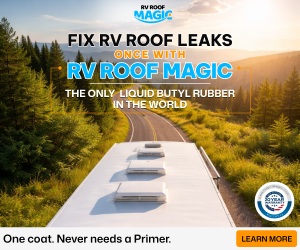As RV owners, we know that our motorhomes and camper vans are more than just vehicles—they’re investments in freedom, adventure, and memories. But if you own a Class A, Class B, or Class C RV, there’s one seasonal task you can’t afford to skip: winterization.
Winterizing your RV is the process of protecting its plumbing, appliances, and systems from freezing temperatures. Done properly, it ensures your home on wheels stays in great condition and avoids costly damage during the off-season.
When Should You Winterize Your RV?
The timing depends on your location, but a good rule is to winterize your RV before temperatures consistently dip below 32°F (0°C).
- Northern U.S. & Canada – Late September through early November
- Midwestern & Mountain States – Mid to late October
- Southern States – Early to mid-November (or later, depending on climate)
If you’re planning to keep traveling in colder weather, you’ll need alternative strategies like heated hoses, RV skirting, or insulated storage bays. Otherwise, full winterization is the safest choice.
Why Do RVs Need Winterization?
RVs have complex plumbing systems, water tanks, and appliances—all of which are vulnerable to freezing. When water freezes, it expands and can cause:
- Cracked water lines and fittings
- Ruined water pumps and water heaters
- Damaged holding tanks
- Mold, mildew, and musty odors from trapped moisture
- Dead or weakened batteries
In short, skipping winterization could mean hundreds—or even thousands—of dollars in spring repairs.
The Benefits of Annual Winterization
Even if you live in a mild climate, winterizing your RV annually offers key advantages:
- Prevents Costly Repairs – A small investment in RV antifreeze and supplies saves big repair bills.
- Extends RV Life – Protects plumbing, batteries, and appliances from wear.
- Boosts Resale Value – A well-maintained RV shows future buyers you cared for it.
- Peace of Mind – No stress about unseen freeze damage during winter storage.
Step-by-Step RV Winterization Checklist
Here’s a simplified RV winterization checklist you can use whether you own a Class A motorhome, Class B camper van, or Class C RV.
1. Drain the Water System
- Empty fresh water tank.
- Drain gray and black water tanks.
- Flush holding tanks (use an RV-safe tank treatment if needed).
- Open low-point drains and let all water out.
2. Bypass and Drain the Water Heater
- Turn off water heater and allow it to cool.
- Open the drain plug and pressure relief valve.
- Install a water heater bypass kit if your RV doesn’t already have one.
3. Add RV Antifreeze
- Use a water pump converter kit or siphon hose.
- Pump non-toxic RV antifreeze through all water lines.
- Run faucets (hot and cold), showers, and toilets until pink antifreeze flows out.
- Don’t forget outside showers, ice makers, and washing machine lines (if equipped).
4. Protect Drains & Traps
- Pour a small amount of RV antifreeze into every sink, shower drain, and toilet bowl.
5. Care for the Batteries
- Fully charge batteries before storage.
- Disconnect and store them in a cool, dry place if possible.
- Use a trickle charger to maintain charge.
6. Seal & Store Your RV
- Wash and wax the exterior.
- Check seals around windows, doors, and the roof.
- Cover vents and tires.
- If storing outside, use a breathable RV cover.
Final Thoughts: Protecting Your RV Investment
Winterizing your RV isn’t just seasonal maintenance—it’s essential protection for your motorhome, camper van, or travel trailer. By following a proper RV winterization checklist every year, you’ll save money, extend the life of your rig, and be ready to hit the road when spring arrives.
Whether you own a Class A motorhome, Class B camper van, or Class C RV, winterization is your best defense against costly damage. Don’t wait until the first freeze—schedule your RV winterization now and enjoy the peace of mind that comes with knowing your RV is safe until your next adventure.



